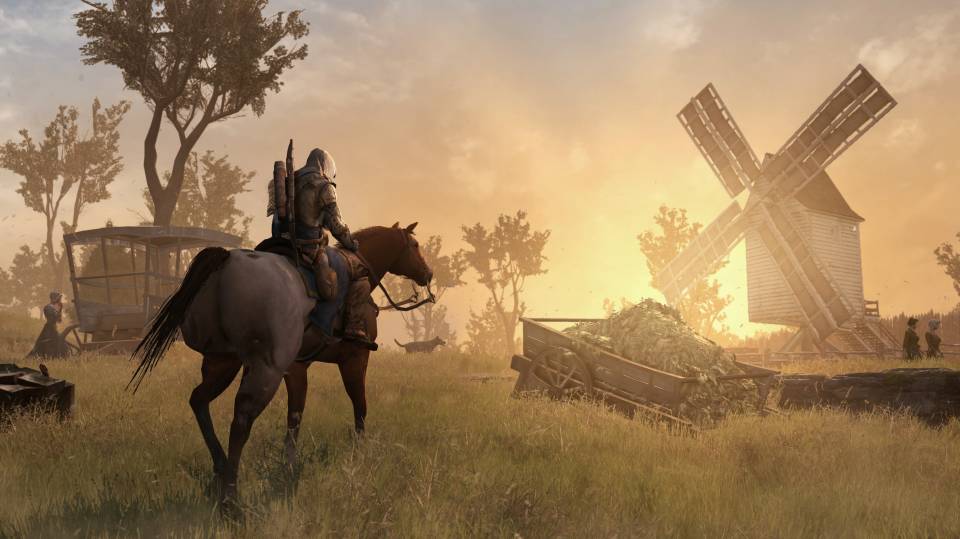
Ubisoft has made it a point to repeatedly describe Assassin's Creed III as "one of the most anticipated games of all-time." It's right there at the front of each of the publisher's behind-the-scenes looks at the game. I don't know what basis Ubisoft is using to make that claim--possibly they're examining pre-order numbers and making an educated guess--but regardless as to whether it's true, the publisher has done an excellent job marketing this latest Assassin's sequel as if it is. Assassin's Creed III was one of the stand-out demos at this year's E3, garnering all sorts of awards, mostly for its incredible visual presentation and seemingly fluid assassination gameplay.
I say seemingly only because most of us never actually got to put our hands on the game. Assassin's Creed III's E3 presentation was steered exclusively by developers working on the game, as were all subsequent demos shown to the public. In fact, this past week marked the first occasion on which Ubisoft allowed a wide swath of press types to lay hand to controller in a fully hands-on demo of the game.
What I found in my time with Assassin's Creed III is a game that offers no shortage of ambition. The three years Ubisoft has spent developing AC III is readily apparent in the sheer volume of systems and upgrades and straight-up new features peppered throughout the experience. And yet, with that in mind, this is still very much an Assassin's Creed game. For all the marketing's talk of radical changes from where things have been the last couple of years in this series, the truth is, you could pretty easily slot this game right down in front of Assassin's Creed: Revelations. It feels like a progression, not an overwhelming shift.
For some, that's likely good news. For those who have hoped that maybe this time around, Ubisoft had found a tighter, more comfortable balance between the aerobatic craziness and timing-focused stabbings, you may find Assassin's Creed III an improvement, albeit not a drastic one.
The Final Frontier
Admittedly, I may not have seen all the new combat and gameplay systems on offer, because I, like the rest of the press shown this near-final build of the game, was essentially dropped into the deep end. The missions we played fell somewhere toward the early middle of the game, several chapters into the assassination career of Connor, the series' new protagonist. Looking at Connor's inventory screens, it's apparent right away that there's more to wrestle with here than in previous games. You have more weapons, more ways of taking on the redcoats and Templars that stand in your path.
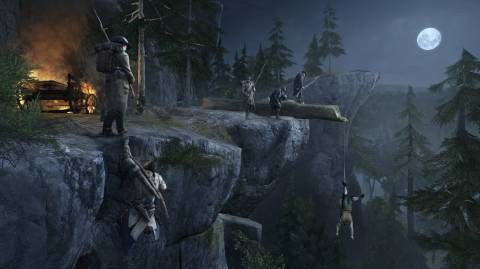
I don't mention continual series protagonist Desmond because we were shown no story elements featuring him. Instead, we joined Connor during the formative years of the American Revolution. Connor finds himself in the company of would-be patriots, including the likes of Samuel Adams. Adams and Connor already have a familiarity with each other at this point in the game, though it's unclear how. All I'm told is that Connor's interests overlap with the assassin's goal of rooting out the Templars currently on American soil.
To do this, I found myself wandering between the city of Boston and the new frontier area. To say that Ubisoft has taken some liberties with the design of New England's geography would be an understatement. Just outside the city walls of Boston, we find a massive frontier, full of relatively dense foliage, rock walls, and rivers. Animal life permeates the landscape, including some rather nasty predators like wolves and bears. Connor, given his Native American heritage, is adept at navigating the land and hunting its creatures, which you'll do for pelts and other animal goods that can be sold or consumed.
Navigating the frontier is by far the biggest change longtime fans will find themselves wrestling with. Accustomed to the bustling streets of ancient cities, the frontier provides a great deal more nature than structure. You'll have to get accustomed to figuring out which trees and rocks can be traversed, and which are simply inaccessible. With trees that's easier, but rocks can be tough to size up quickly, while pursuing or being pursued. It's going to take you some time to learn the subtle differences.
Fortunately, the controls are generally responsive when traversing nature's obstacles. Outside of a couple of minor hiccups, I found myself mostly floating from tree-to-tree as I would rooftop-to-rooftop in any of the series' previous cities. It's different and familiar all at once.
The Old Homestead
The frontier also happens to house your base of operations. The homestead, which is managed by an older (possibly freed) slave named Achilles, is where you'll come to discover side missions, as well as populate the surrounding area with tradesmen and other settlers. You'll meet such folk while exploring side missions throughout the frontier. In one case I found myself chasing after poachers who attacked a young frontier woman, and in another I had to rescue a traveling tradesman from a gang of highway bandits. These people, thankful for your help, join your little frontier community, giving you new people to trade with.
Here is also where you'll find one of the many dock ports you can use to take on a naval mission.
Two, if by Sea
Once you get out onto the ocean in Assassin's Creed III, it's like a whole other game opens up. Granted, that game is a strange, sometimes frustrating arcade naval combat simulator, but apart from that, it's cool.
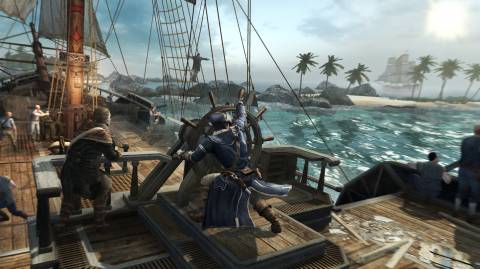
For reasons that were not quite explained in any of the missions I played, Connor has access to a naval warship he can sail up and down the eastern seaboard at his leisure. I took on one of the closer-by missions, which required me to escort a merchant's ship to shore at Martha's Vineyard, while British gunboats closed in on the ship's position. Through this mission, I got to try out two distinct methods of naval combat. When engaging the British gunboats, a more nimble, less overtly powerful gun was used, whereas later, when engaging a well-defended fort, I began firing off the cannons. In either event, you'll have to juggle steering the ship and aiming your guns at the same time. When fighting the ships, accuracy was more imperative, while with the cannons, all I really had to do was line the ship up more or less alongside the fort and just blast away.
This is just one mission in what appears to be a whole plot subsection unto itself. Hopefully there's some good context for why Connor's also a master and commander of a ship in his spare hours, but even without, the naval stuff at least seems to make for a fun, if wildly different gameplay experience. It's certainly an improvement over the tower defense stuff from the last go-around.
The Sacred Art of Stabbing That Guy
One of the biggest alterations Ubisoft has been selling on Assassin's Creed III is a completely overhauled combat system. The goal was to make Connor's ability to navigate the city streets and untouched wilderness with greater deftness, while essentially jumping in and out of combat at the drop of a hat. After fiddling with it over several missions, I'll say that there are definitely moments when the new animations and mechanics make for truly thrilling moments. And yet, there are others where that fluidity doesn't come through at all, and those moments arguably stand out more.
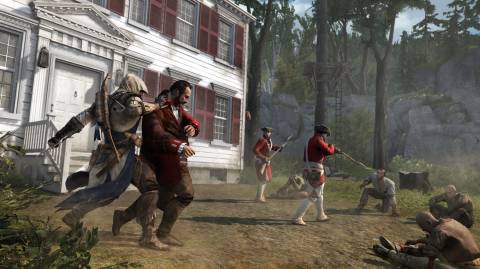
Without getting too preachy about one man's system over another, I feel like it's safe to say that in a post-Arkham Asylum world, there is an expectation to how combat in a hand-to-hand-focused game like this should feel. Assassin's Creed III lives up to that expectation in fits and starts, if what I've seen is representative of the greater whole.
First, the good. One of the absolute best things about the system is the addition of running assassinations. With this maneuver, you can pretty much just run up on a guy full speed, and if you time your attack, you'll use whatever weapon you have on you to deftly, remorselessly murder whatever guy happens to be in your way, while tossing aside his body in one swift motion. It's a beautifully horrible thing to behold.
On the flip side, straight-up hand-to-hand combat feels good, but not great. Part of the problem admittedly had to do with being dropped in well into the game, where different methods necessary to kill off special types of enemies are undoubtedly briefed to the player. So without that information, I found myself relying on counter attacks and less-focused stabbings and bludgeonings of my enemies. There are tons of different combo moves that can result in incredibly gruesome/frankly hilarious finishing moves. But when they don't, you tend to find yourself in sometimes dull, often brief knife/sword/hatchet battles with guys either shoving or firing muskets at you. It's fun enough when you're pulling off the top flight moves, but the basic combat still feels a bit sluggish at times, as if animations are overtaking the player's control, resulting in maneuvers not coming out quickly enough to avoid attacks. It's not unmanageable, but it does feel inelegant compared with some of the better hand-to-hand combat games of late.
Assassinating With Friends
As is custom nowadays, Assassin's Creed III comes with its own multiplayer component, where teams of Abstergo employees can "train" to fight the assassins by killing randomized targets, or each other. I got to try both the competitive and cooperative modes. Competitively, it's what you'd expect. You choose an avatar and walk around an environment with your competitors. You're given a designated target to kill, but another player has also been given you as a target, thus requiring you to always keep one eye over your shoulder while stalking your own prey. Cooperative is the same idea, except you're all a team working toward the same target.
If you had any affinity for previous Assassin's multiplayer modes, you shouldn't have any issues with this one. It seemingly makes enough smart changes to be a good amount of fun, provided you've got some able assassins around to play against/with.
On Liberation
Ubisoft also gave us brief access to Assassin's Creed III: Liberation, the Vita-only side story featuring Aveline, a female assassin in 18th century New Orleans. Though her plot overlaps with some of AC III's timelines, hers is an entirely separate story. I played through a little of it, and found a game that certainly feels like Assassin's Creed, albeit stiffer in a few key ways.
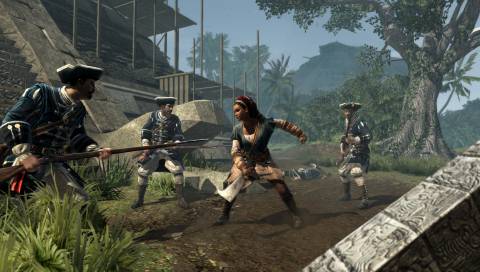
Once again, I was dropped in a tad too far into the game to precisely glean what was going on in the story, but the basic idea seemed to revolve around Aveline's stalking of a local governor, who after much rabble-rousing from the townspeople, finds himself on the wrong end of a revolution. Aveline, along with a friendly French dandy, began to incite riots among the people, while murdering the occasional guard in the process.
Maybe it's just because I had spent hours prior playing the console game, but in playing the Vita version, I generally found myself thrilled with neither the animation nor the mission designs I saw. While the scaling down of certain things is inevitable given the platform differences, Assassin's Creed doesn't feel quite right if the movements of its lead character don't have a graceful flow to them. Aveline's movements often seemed a bit stiff and labored. And while swinging around a giant port city was certainly fun, the missions I was presented with--at least two of which featured fail conditions if I was spotted--dragged. Even the promise of riding an explosive carriage into a winery for some reason didn't really get me particularly excited. I wish I had a more elegant way of saying the game just felt "off," but that's really all I've got.
But Is it Fun?
With Liberation, I can't say I've seen enough to say one way or the other. But as for Assassin's Creed III?Yes. Assassin's Creed III is lots of fun. When the stars align and you get into the rhythms of the combat and traversal mechanics, the gameplay becomes a sweet mixture of terrific animation and fantastic world design. I think it's necessary to come in with reasonable expectations, of course. Assassin's Creed III does a lot of things new, and not every single one of them works to the game's advantage. And likewise, certain things that might look revelatory in a trailer might not be quite so when you have the controller in-hand. But first and foremost, I had fun while playing Assassin's Creed III, something I didn't have during my brief bouts with AC: Brotherhood and Revelations. Take that for what it's worth.